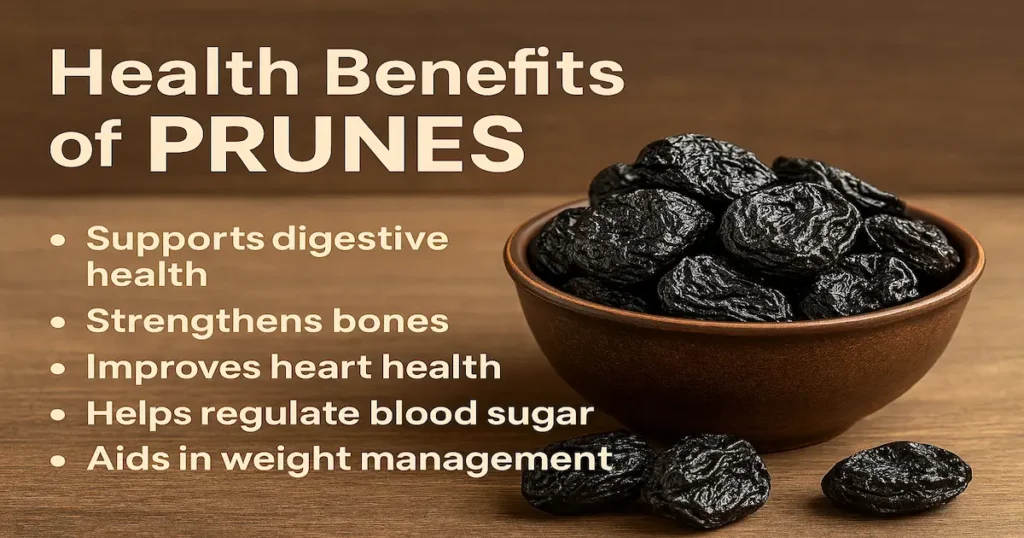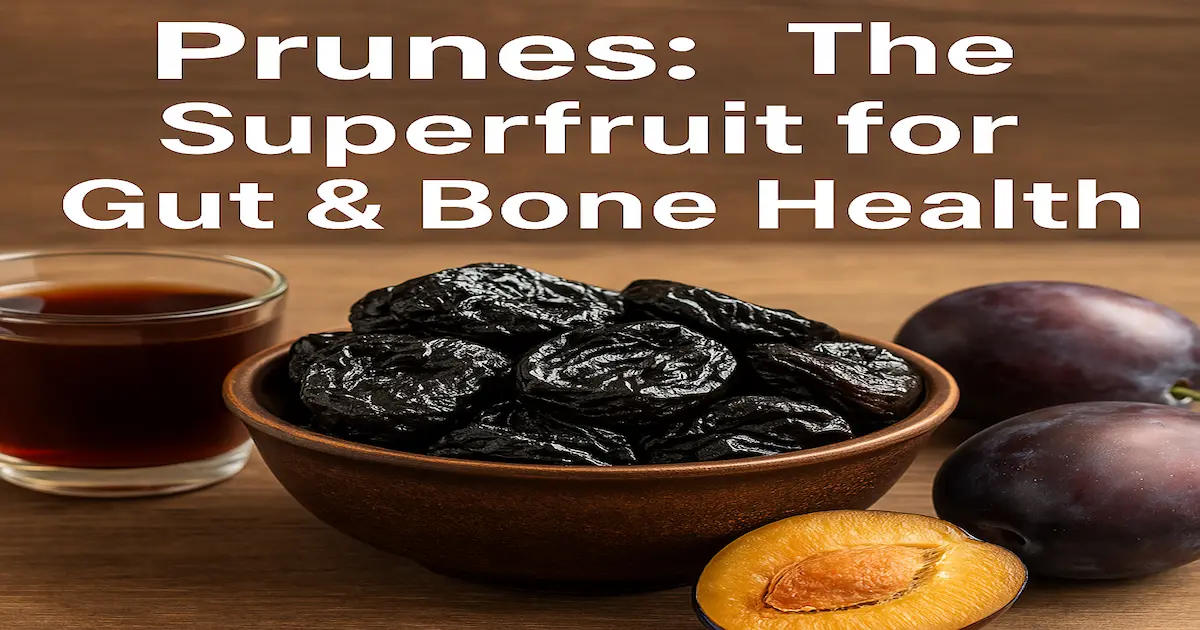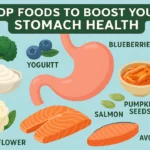Prunes are dried plums, usually made from a specific variety called European plums. They are created by slowly drying fresh plums until they become chewy and sweet. This drying process keeps the nutrients inside, turning plums into a powerful and tasty snack.
Long ago, people used prunes for food preservation. Today, they’re popular again for being a nutrient-rich dried fruit. Americans are rediscovering this natural laxative fruit for its health benefits.
With their chewy texture and sweet-savory flavor, prunes are no longer just for the elderly—they’re for everyone who wants to eat smarter. Lets dive in!
Prunes vs. Plums – What’s the Difference?
Prunes vs plums is a common question. Both come from the same fruit, but there are key differences. Plums are fresh, juicy, and perishable. Prunes are dried, sweet, and last longer on the shelf. Plums must be eaten quickly, while prunes can be stored for months.
Taste and usage also vary. Prunes are sweeter and softer, often used for baking, snacking, or making prune juice. Plums are tart and eaten raw. Prunes nutrition facts show that drying concentrates their nutrients. You get more fiber, iron, and antioxidants per serving from prunes than plums.
Nutritional Profile of Prunes
Prunes are small but mighty. They are high in dietary fiber, vitamin K, potassium, and antioxidants in prunes help fight cell damage. The high fiber and sorbitol content are especially good for digestion. They also contain polyphenols, which help reduce inflammation.
Here’s a quick look at the prune nutrition facts per 100g:
| Nutrient | Amount |
|---|---|
| Calories | 240 kcal |
| Dietary Fiber | 7 g |
| Sugars | 38 g |
| Sorbitol in prunes | 15 g |
| Potassium | 732 mg |
| Vitamin K in prunes | 60 mcg |
| Iron | 0.9 mg |
| Vitamin B6 | 0.2 mg |
This powerful blend makes prunes a top functional food ingredient for daily diets.
Health Benefits of Prunes

There are many prunes health benefits backed by science. Prunes help with constipation relief thanks to their natural laxative fruit effects. The high fiber and sorbitol content makes bowel movements easier and more regular. That’s why many people use prunes for constipation.
Studies also link bone health and prunes. They help reduce bone loss, especially in postmenopausal women. Prunes and blood pressure are connected too. Their potassium helps balance sodium and lower hypertension risk.
Prunes also support blood glucose and cholesterol control, and help manage appetite. They are good for gut microbiome diversity, helping keep your digestive system balanced and healthy.
Prunes in a Balanced Diet
You can eat prunes in diet in many ways. Try them in oatmeal, smoothies, or stewed prunes as a warm snack. Add chopped prunes to yogurt, cereal, or baked goods. They also work as a natural sweetener in recipes.
In the kitchen, you can mash prunes into sauces, meat glazes, or dressings. Some people even enjoy homemade prune juice. Prunes fit in children’s diet as well. They provide fiber and sweetness without added sugar. As a functional food ingredient, they’re versatile and healthy.
How Many Prunes Should You Eat Daily?
It’s important to know the daily recommended prune intake. Most adults can eat 4 to 5 prunes a day safely. This amount supports healthy bowel movements without causing side effects. For children’s diet, 1 to 2 prunes are enough. Always check with a doctor if unsure.
Eating prunes in moderation gives the prunes health benefits without risk. Overeating prunes may lead to gastrointestinal distress or sugar overload. Use prunes to improve health but keep portions in check for best results.
Potential Side Effects of Eating Too Many Prunes
While prunes are healthy, too many can cause prunes side effects. Common problems include bloating, gas, and diarrhea due to polyol sugars and bloating from sorbitol in prunes. Some people feel discomfort or cramps after eating too many.
People with digestive issues should be careful. If you have prune allergy symptoms, like itching or swelling, stop eating them. Some people with birch pollen allergies may also react due to prune allergy and birch pollen link.
Others worry about acrylamide exposure in dried fruits, but levels in prunes are generally safe.
Storing and Choosing Prunes Wisely
To keep prunes fresh, know how to store prunes. Keep them in an airtight container in a cool, dark place. For longer storage, refrigerate them. Sealed prunes last 6 months to a year. If prunes become too dry, soak them in water to soften.
When buying prunes, look for soft texture and no added sugar. Choose organic or preservative-free options when possible. Avoid dried fruits with too much sulfur dioxide. Also, check the label for quality and expiration date to get the best product.
Prunes: Fun Facts, Myths, and Trends
Many people think prunes are only for older adults. That’s not true. Prunes are great for athletes, kids, and anyone wanting better digestion.
Prunes and overactive bladder is another myth. Prunes do not cause bladder problems; they actually help regulate bowel function, which supports bladder health.
Prunes are trending in sports nutrition and even plant-based diets. Some new research is exploring how prunes may reduce inflammation in joints.
A fun fact: stewing prunes for consumption makes them easier to digest and brings out more flavor. And yes, prunes vs dates—prunes have more fiber and less sugar than dates!
FAQs about Prunes
Are prunes good for relieving constipation?
Yes, prunes are a top constipation relief food. Their natural laxative fruit effect helps make digestion smooth.
Do prunes support bone strength?
Absolutely. Studies show a link between bone health and prunes, especially in postmenopausal women.
Can diabetics eat prunes safely?
Yes, in small amounts. Prunes have fiber that slows sugar spikes and help with blood glucose and cholesterol control.
How many prunes per day are safe to eat?
For adults, the daily recommended prune intake is 4 to 5. For children, 1 to 2 is enough.
Do prunes help improve gut health?
Yes, prunes support gut microbiome diversity by feeding healthy bacteria and improving digestion.
Conclusion: The Power of Prunes in Daily Life
Prunes are more than just dried fruit. They are a nutrient-rich dried fruit packed with fiber, antioxidants, and key vitamins.
From helping with prunes and digestion to supporting bone health, these dried plums offer many benefits. They are a smart, natural way to stay healthy.
Whether you’re using stewed prunes, adding them to smoothies, or sipping homemade prune juice, there are many tasty ways to enjoy them.
Just remember the side effects of overconsumption. Like all good things, prunes are best in balance. Make them part of your daily diet and enjoy the prunes health benefits that people have trusted for generations.












